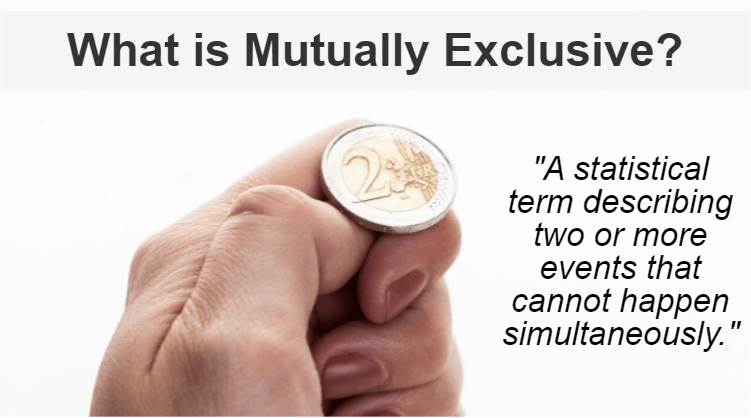Mutually Exclusive: What It Means, With ExamplesWhat is Mutually Exclusive?A statistical phrase used to describe occurrences that cannot occur concurrently is referred to as "mutually exclusive". The term is frequently used to refer to circumstances in which the occurrence of one event takes precedence over the other. For instance, war and peace can't exist together. They are therefore opposed to one another. Similarly, one coin will depict heads or tails at a time. 
Key Takeaways
Understanding Mutually ExclusiveOccurrences that cannot both occur at once should not be regarded as distinct events. They are called mutually exclusive. Independent occurrences have little bearing on whether alternative solutions are viable. Take rolling the dice as a simple illustration. You cannot simultaneously move a three and a five on the same dice. On two dice, you can roll a five and a three. The results are mutually exclusive only when you roll a five and a three on the same dice. If you move a five on it and a three on the other, the results are not considered mutually exclusive. Opportunity CostA firm must consider the opportunity cost or what the corporation would put into pursuing each option when given a chance between two mutually incompatible possibilities. Because each mutually exclusive choice necessitates the loss of any gains that could have been made by selecting the alternative, the ideas of economic cost and mutual exclusivity are inextricably intertwined. Analysis of mutual exclusion is slightly complicated by the temporal value of money (TVM) and other considerations. When deciding among two or more mutually incompatible choices, businesses utilize the net present value (NPV) or internal rate of return (IRR) calculations to quantitatively assess which project is more advantageous. Example of Mutually ExclusiveIn capital budgeting, the idea of mutual exclusivity is frequently used. Businesses may have to choose between initiatives that, once completed, will provide value to the organization. Some of these initiatives conflict with one another. Let's say a business has a $50,000 budget for growth initiatives. Projects A and B are incompatible if they are both feasible and cost $40,000, whereas Project C only costs $10,000. The business cannot afford to follow B if it pursues A and vice versa. Project C may be seen as being autonomous. The company can still pursue C regardless of the other chosen project. The feasibility of C is unaffected by the approval of either A or B, and the feasibility of any of the other projects is unaffected by the acceptance of C. Consider the study of Projects A and B when examining opportunity costs. Although Project B will only yield $80,000, Project A might pay $100,000. Given that options A and B are mutually exclusive, the economic cost of selecting B is equal to the difference between the profits produced by the most profitable choice (in this example, A) and the chosen option (B), or $100,000 minus $80,000, or $20,000. Option A has zero opportunity cost since it is the most profitable choice. What does it mean if the projects are Mutually Exclusive?Managers and directors frequently have to consider how to allocate resources in the workplace. A corporation constructing a bridge and a skyscraper may find that they are mutually exclusive since only one of the highly specialized equipment needed for both projects is available globally. This is because the equipment cannot be employed for both simultaneously on both projects. This concept may be expanded to account for designated funds, specialist personnel, and software platforms (which cannot run both Mac and Windows). What is the difference between Independent and Mutually Exclusive?Think of the last example of war and peace, showing the difference between those that are autonomous and those that are mutually incompatible. Italy might experience calm as France goes to war. Since these two countries are independent of one another, they might each be at peace with themselves. However, France might not simultaneously experience peace during the war. That makes them mutually exclusive since they (war and peace) are unable to coexist together. What does Mutually Exclusive mean in Finance?Usually, this entails payments and budgets. If a corporation has $180 million to invest, it cannot do both reinvesting in the firm and giving incentives to high management with the same $180 million. In this instance, the two possibilities are incompatible. Likewise, if a corporation can only maintain licencing in one nation, it shouldn't try to hold licences in two countries as they are mutually exclusive. The Bottom LineMutually exclusive events cannot take place at the same time. This usually involves starting initiatives or setting aside money in the corporate world. When two things do not conflict with one another, it is said that they are not necessarily incompatible with one another. |
 For Videos Join Our Youtube Channel: Join Now
For Videos Join Our Youtube Channel: Join Now
Feedback
- Send your Feedback to [email protected]
Help Others, Please Share









